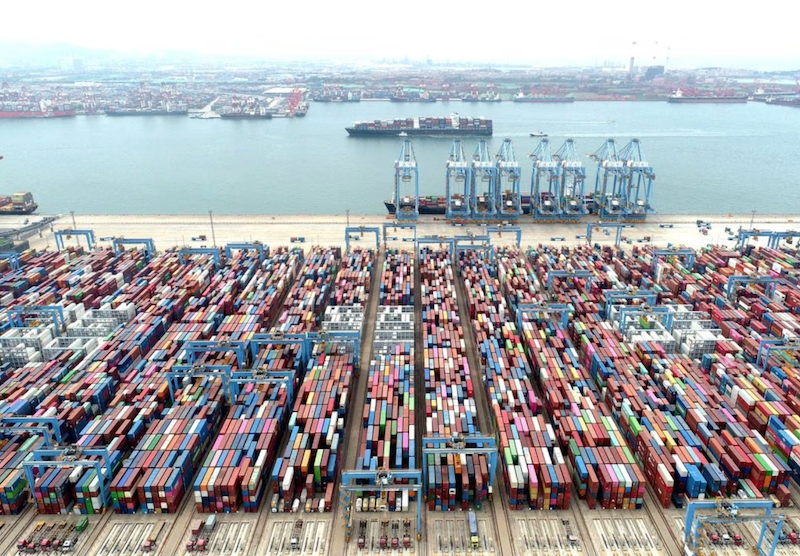Attacks by the Iran-aligned Yemeni Houthi militant group on ships in the Red Sea has forced leading global freight firms to reroute vessels to avoid the Suez Canal – the critical shipping route between Asia and Europe
The group said it launched a drone attack on two cargo vessels in the area on Monday, the latest in a series of missile and drone strikes on shipping which it says are a response to Israel’s assault on the Gaza Strip.
Several major freight companies – including MSC – have begun to sail around Africa instead, adding costs and delays which are expected to be compounded over the coming weeks, according to industry analysts.
About 15% of world shipping traffic transits via the Suez Canal, the shortest shipping route between Europe and Asia.
Also on AF: Tencent Leans on Old Foe ByteDance in Gaming Dominance Bid
The war between Israel and Hamas, which began on October 7, has sent shockwaves through the region and threatened to cause a broader conflict.
The Red Sea attacks have showed the ability of Middle Eastern paramilitary forces backed by Iran to upset global trade at a time when Tehran and its proxies are positioning themselves against the United States and Israel.
Combined, the companies that have diverted vessels “control around half of the global container shipping market,” ABN Amro analyst Albert Jan Swart told Reuters. “Avoiding the Red Sea will lead to higher cost due to longer travel time,” Swart said.
Oil major BP temporarily paused all transits through the Red Sea and oil tanker group Frontline said on Monday its vessels will avoid passages through the waterway, signs the crisis was broadening to include energy shipments. Crude oil prices rose on those concerns on Monday.
“War risk insurance premiums are on the rise naturally, but as vessels gets re-routed around Africa shipping supply will be tighter as cargoes travel longer,” Frontline CEO Lars Barstad told Reuters. “That would put rates under a strong upwards pressure.”
Later on Monday, Norwegian energy group Equinor said it had rerouted “a few ships” carrying crude oil and liquefied petroleum gas (LPG) away from the Red Sea. The company declined to say how many vessels were affected.
Tanker firm Euronav said it was avoiding the Red Sea until further notice.
The Houthi attacks were also forcing companies to rethink their connections with Israel, with Taiwan’s Evergreen Marine saying on Monday it had decided to temporarily stop accepting Israeli cargo.
US Leads Task Force Talks
The shipping attacks have prompted the United States and its allies to discuss a task force that would protect Red Sea routes, a move that US and Israeli arch-foe Tehran has warned would be a mistake.
Visiting Israel on Monday, US Defense Secretary Lloyd Austin said no group or state should test America’s resolve.
“In the Red Sea we’re leading a multi-national maritime task force to uphold the bedrock principle of freedom of navigation,” he said.
The effects include significantly slower shipments and potentially higher prices for consumers, analysts said.
Rico Luman, an analyst at ING, said the diversions were adding at least a week of sailing time for container liners. Typically, shipping goods from Shanghai to Rotterdam takes around 27 days via the Suez Canal.
“This will at least lead to delays in late December, with knock-on effects in January and probably February as the next round will also be delayed,” Luman said.
The disruptions would likely affect supply of consumer goods ahead of the Chinese new year in particular, with delays leaving retailers with unsellable stock and ultimately driving up prices for consumers, said Marco Forgione, director general at the Institute of Export and International Trade.
While freight rates will likely increase on these longer voyages too, carriers at the moment are seeking ways to utilise excess capacity, said Zvi Schreiber, CEO of global freight platform Freightos.
“It is unlikely that rates will spike to levels experienced during the pandemic,” said Schreiber, referring to the economic effects of Covid-19 from 2020.
- Reuters with additional editing by Sean O’Meara
Read more:
Shipping Group Maersk Cuts Growth Outlook on China Curbs
Israel Probing Short-Selling Before Hamas Attack – Guardian
Shipping firms warn of vessel delays amid South China ports Covid surge
Grounded Suez Canal ship puts automotive industry at risk
























